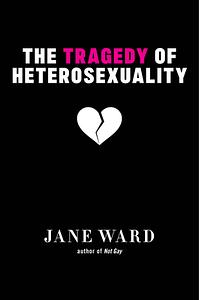Take a photo of a barcode or cover
informative
reflective
medium-paced
challenging
hopeful
informative
reflective
medium-paced
It’s a 3.5, but rounding up for subject matter. The book is a quick read and exploration of the institution of heterosexuality in the first half (which is really successful and interesting) and heterosexually itself in the second (less successful).
As a queer woman, I went into this book expecting to confirm what me and all my friend talk about - that there seems to be a weird blatant dislike between men and women despite heterosexuality being lauded as the “natural” relationship between the two - and I found that when the author discusses the “misogyny paradox” and “the contradictions and miseries of straightness”! The author’s historical examination of heterosexuality as a project of white supremacy and eugenics is fascinating… But then the second half of the book where the author provides “solutions to straight suffering” was haphazard and unfulfilling.
I’d still recommend the read.
As a queer woman, I went into this book expecting to confirm what me and all my friend talk about - that there seems to be a weird blatant dislike between men and women despite heterosexuality being lauded as the “natural” relationship between the two - and I found that when the author discusses the “misogyny paradox” and “the contradictions and miseries of straightness”! The author’s historical examination of heterosexuality as a project of white supremacy and eugenics is fascinating… But then the second half of the book where the author provides “solutions to straight suffering” was haphazard and unfulfilling.
I’d still recommend the read.
An absolute masterpiece encapsulating my lesbian rage and frustration when I am forced to witness/hear about this tragedy on a regular basis. Should be required reading for all straighties, every bi girl with her boyfriend, and everyone else too bc none of us is fully exempt from this horrific trap of relational heteronormativity.
challenging
informative
reflective
medium-paced
To start with the good, this book does have an interesting examination of the heterosexual repair industry, pickup artists, and the ways that queerness challenges exptected heterosexual misery by giving an alternative to the expected "women be miserable and do all the labor while men should be working and hate their wives" narrative. I think that for cishet people who have a limited understanding of feminism and have resigned themselves to misery this could be a useful an insightful read.
That being said, I went into this really expecting an analysis of straight culture through a queer cultural lens, and instead ended up with "as a lesbian, this was weird to hear" for a majority of the book. I'd estimate that 10-15% of the book actually delves deeper past the surface of straight culture being weird and often shallow. Also, I couldn't help but feel the analysis being given could have really benefitted from a trans gender-fuckery perspective. While she is analyzing heterosexual culture, above all else she's analyzing *cisgender* heterosexual culture. Who better to analyze this than those who challenge heteropatriarchy the most? Especially genderqueer POC, who fit into these molds the least. To be fair, in the beginning of the book she does make it clear she's a white lesbian and the limits of her perspective. While I appreciate the self awareness you could really feel the lack of perspective for much of the book.
That being said, I went into this really expecting an analysis of straight culture through a queer cultural lens, and instead ended up with "as a lesbian, this was weird to hear" for a majority of the book. I'd estimate that 10-15% of the book actually delves deeper past the surface of straight culture being weird and often shallow. Also, I couldn't help but feel the analysis being given could have really benefitted from a trans gender-fuckery perspective. While she is analyzing heterosexual culture, above all else she's analyzing *cisgender* heterosexual culture. Who better to analyze this than those who challenge heteropatriarchy the most? Especially genderqueer POC, who fit into these molds the least. To be fair, in the beginning of the book she does make it clear she's a white lesbian and the limits of her perspective. While I appreciate the self awareness you could really feel the lack of perspective for much of the book.
Graphic: Sexism
Minor: Rape, Sexual assault, Sexual harassment
informative
medium-paced
emotional
informative
reflective
sad
fast-paced
This was super depressing because the more I read about toxic masculinity and patriarchy, the more I feel like it's intention is to keep us apart, and from building strong relationships and intimacy with others. Heterosexuality as it stands is a tragedy, and though this book takes a little bit to get there, it makes many excellent points of the blatant misogyny that permeates into almost every aspect of heterosexual romantic relationships. I do think some parts were harder to get through and didn't make as clear connections to the rest of the book, but overall, I'd recommend this to everyone!
Graphic: Misogyny, Sexism, Sexual violence, Toxic relationship
Moderate: Domestic abuse, Emotional abuse, Fatphobia, Sexual assault
informative
reflective
fast-paced
hopeful
informative
inspiring
reflective
medium-paced
funny
informative
reflective
fast-paced



